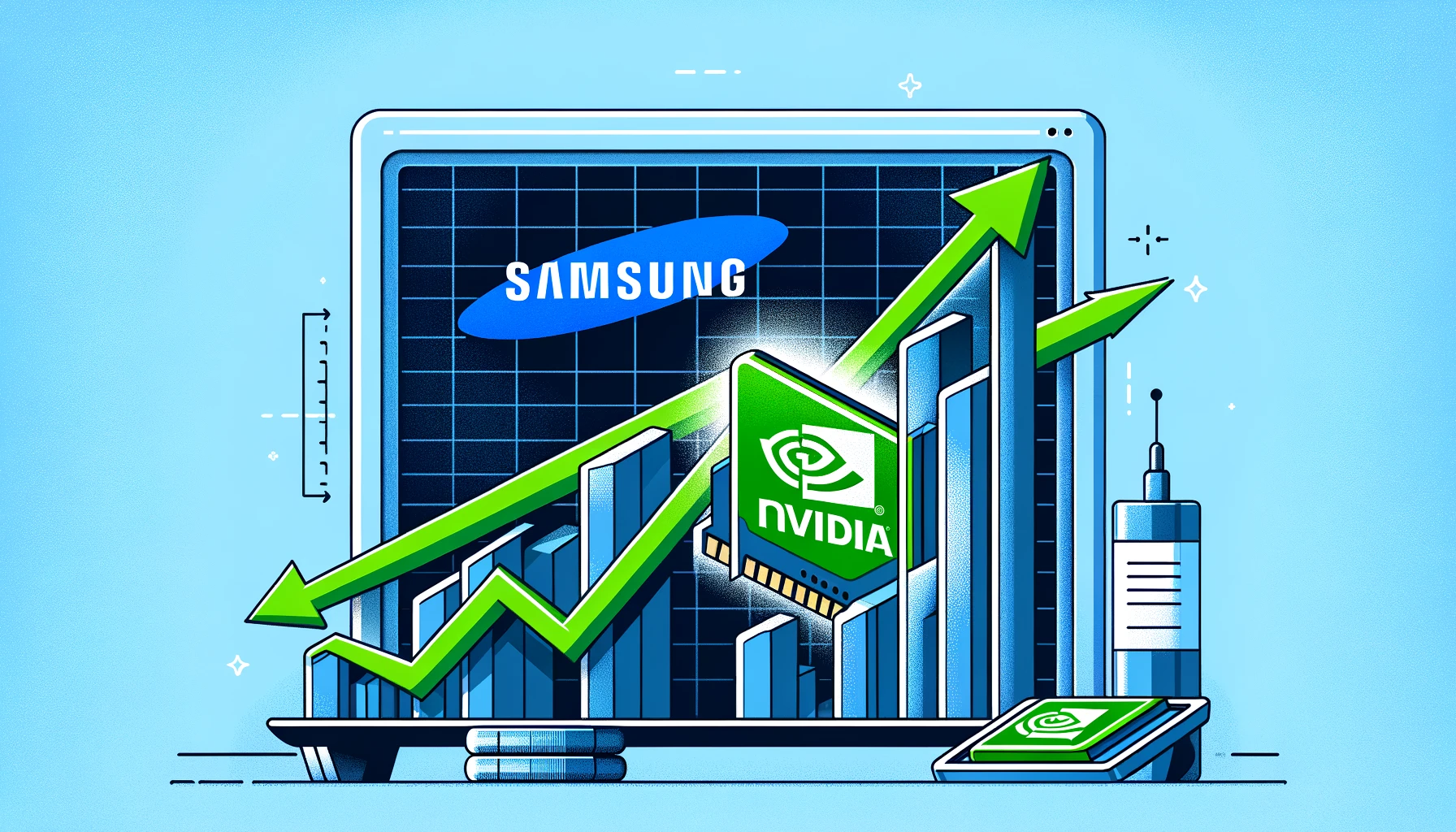
Samsung Electronics Co‘s shares saw a significant rise after Nvidia Corp announced that it is in the process of certifying Samsung’s high-bandwidth memory (HBM) chips. This crucial development could allow the South Korean tech giant to tap into the rapidly growing demand for artificial intelligence (AI) technologies.
Samsung’s stock surged by as much as 3.6% during early trading on Wednesday in Seoul. Before this uptick, Samsung shares had experienced a roughly 4% decline this year, lagging behind leading chip manufacturers. This market reaction underscores the potential impact of Nvidia’s certification on Samsung’s business prospects.
Market Performance Snapshot
| Company | Stock Change (Wednesday) | Year-to-Date Performance |
|---|---|---|
| Samsung | +3.6% | -4% |
| SK Hynix | -2.3% | +XX% |
- Certification by Nvidia: Critical for market competition.
- Stock Performance: Sharp rise in Samsung’s shares.
- HBM Chips: Significant for AI technology.
- Engineering Work: Required for Samsung’s HBMs.
- Market Dynamics: SK Hynix’s dominance and capacity constraints.
Nvidia’s CEO, Jensen Huang, revealed on Tuesday that the company is currently assessing HBM chips from both Samsung and Micron Technology Inc. Nvidia’s certification is essential for these companies to effectively compete with SK Hynix Inc, which has seen a substantial increase in its share price due to its supply of HBM3 and HBM3e chips to Nvidia.
“Despite initial setbacks in gaining Nvidia’s approval for its eight-layer HBM3e, we are quite optimistic about approval in the next two to three months,” stated Sanjeev Rana, an analyst at CLSA Securities Korea.
Samsung has struggled to keep up with its smaller rival in this booming market segment, primarily due to the extensive engineering work required for its HBM products. These chips are crucial for training AI models like ChatGPT. Although Samsung hasn’t failed any qualification tests, its HBMs needed additional engineering refinements, according to Huang.
“We just have to do the engineering. It’s just not done,” Huang commented during a briefing at Computex in Taipei. “I want it to be done by yesterday (Monday). But it’s not done yet. We have to be patient.”
Following Huang’s remarks, SK Hynix’s stock dropped by as much as 2.3% on Wednesday. This reaction highlights the market’s sensitivity to Nvidia’s certification process and the competitive dynamics among HBM suppliers.
Huang’s comments also addressed a Reuters report that suggested Samsung was dealing with heat and power consumption issues in its HBMs, which are designed to work with Nvidia’s AI accelerators.
“There’s no story there,” Huang said when directly questioned about the article.
Investors have been wary of Samsung’s strategy in responding to SK Hynix, which recently reported its fastest revenue growth rate since at least 2010. The widening gap between the two companies is seen as a significant factor behind Samsung’s recent decision to replace the head of its semiconductor division — an unusual move that signaled the company’s determination to regain lost ground.
In contrast, SK Hynix’s production capacity for such chips is nearly fully booked through the next year. Given these capacity constraints, Nvidia stands to benefit from having a robust alternative supplier.
“Nvidia needs more suppliers for HBMs,” noted Masahiro Wakasugi, a technology analyst with Bloomberg Intelligence. “If Samsung can supply the next-gen HBMs, then it would help Nvidia.”
Samsung, the world’s largest producer of memory chips overall, has announced that it has already begun mass production of its latest HBM product, the eight-layer HBM3E. The company also plans to commence mass production of 12-layer versions in the second quarter of the year. Samsung projects that its supply of HBMs will increase by at least three times in 2024 compared to last year. Additionally, Samsung collaborates with Advanced Micro Devices Inc (AMD), a competitor to Nvidia in the AI chip market.
“With improving visibility of imminent supply to Nvidia and AMD in the second half of 2024, we anticipate a relief rally in Samsung shares,” said Rana of CLSA.
| Product | Current Status |
|---|---|
| 8-layer HBM3E | Mass production |
| 12-layer HBM3E | Planned for Q2 |
| Supply Increase | Triple by 2024 |
Key Points for Investors
- Market Potential: AI technologies driving HBM demand.
- Engineering Challenges: Delays in product readiness.
- Strategic Moves: Leadership changes at Samsung.
- Production Capacity: Expanding significantly in 2024.
- Collaborations: Partnership with AMD.
Samsung’s recent share price surge reflects investor optimism regarding Nvidia’s potential certification of its HBM chips. This development could significantly enhance Samsung’s competitive position in the AI technology market, where demand for high-performance memory is booming. While the company faces engineering challenges, its strategic efforts and future production plans suggest a promising outlook.
Nvidia’s need for more HBM suppliers, coupled with Samsung’s capacity expansion and strategic moves, indicate a potentially significant market shift. As Samsung works to overcome its engineering hurdles, the company’s ability to secure Nvidia’s certification will be crucial in shaping its future in the competitive landscape of AI memory technology.
Related News:
Featured Image courtesy of DALL-E by ChatGPT
